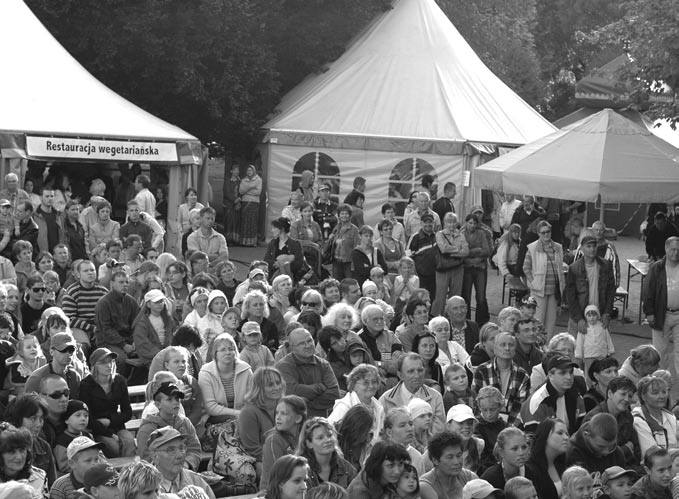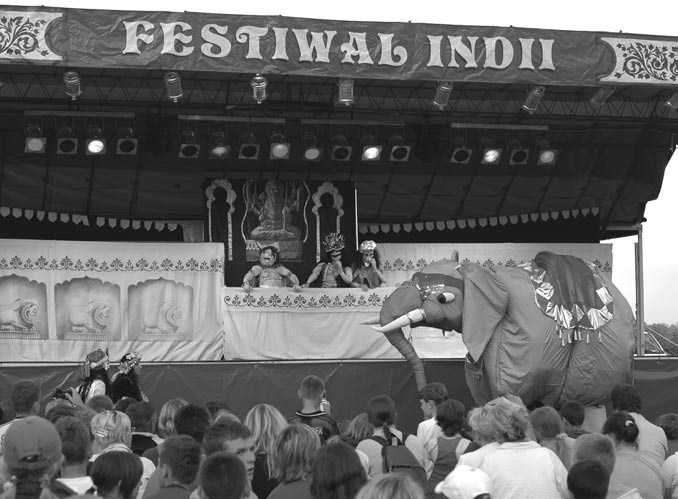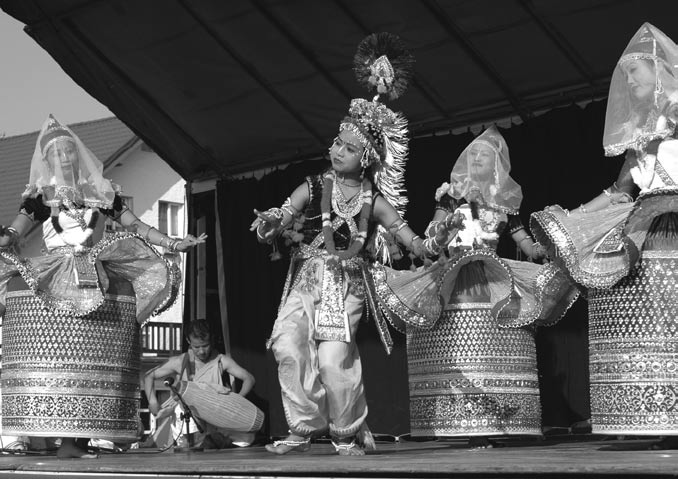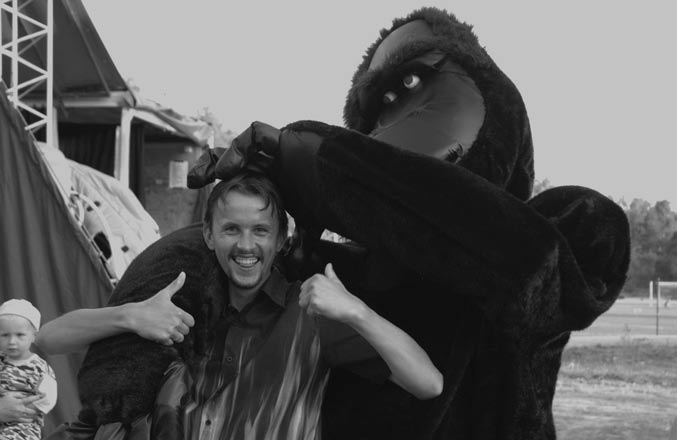By Indradyumna Swami
| April 17 – July 17, 2007 |
I preached in the United States through the first week in June. Then I went to stay with Giriraja Swami in California to rest and prepare myself for the summer festivals in Poland. Every day I chanted and read and also exercised. After months of intense traveling around the world, I had to put myself in shape for the forty-eight rigorous festivals ahead.

During my exercise routines I would meditate on the up-coming tour, visualizing the ISKCON Manipur dance troupe we had invited from India performing on our stage. I also envi-sioned our new theater production, complete with two animals that fight with Krsna and Balarama: a seven-foot gorilla named Dvivida and a ten-foot elephant named Kuvalayapida. I could almost see our guests’ faces light up with amazement.

But one day I received a call from Nandini dasi, and I real-ized I wasn’t the only one meditating on our summer festival tour. So were our ever-present enemies.
“Yesterday,” she said, “I received a call from the headmaster of the school we rent each summer as our base on the coast. He said a government official called him a few days ago and of-fered a large sum of money for renovations on the school – on the condition that the headmaster not rent the school to us this summer. He refused the offer, saying that he had given his word to us and was not going back on his promise.”
I thought about how each year, as soon as we go into action, our opposition rears its ugly head. I remembered a verse from Canyaka’s Pandit’s Niti Sastra:
“The serpent, the king, the tiger, the stinging wasp, the small child, the dog owned by other people and the fool: these seven ought not to be awakened from sleep.”
[ Niti Sastra, Chapter 9, Verse 7 ]
Two days later the plot thickened. Jayatam phoned to say he’d just received a call from the headmaster of the school of Kostrzyn, which we rent for our devotees each year during the Woodstock festival in August.
“The government also offered him a substantial amount of money for reparations on the school,” Jayatam said, “and insist-ed the work take place during the month of August. As a result, he said he wouldn’t be able to rent the school to us during the Woodstock festival. It’s obviously part of a greater strategy.”
“In time of war,” I said under my breath, “the first casualty is truth.”
[ Boake Carter ]
A few days later I flew back to Warsaw where we met and prepared a strategy. Nandini began the meeting by telling us she was also having serious difficulty getting permission for our festival in Kolobrzeg. It is the largest and most prestigious of the towns along the coast, and last year the Indian Ambassador was our special guest at the festival there. At the meeting I sug-gested that Nandini and Jayatam speak personally with anyone who was involved, friend or foe.
Nandini immediately called the mayor in Kostrzyn. After arranging a meeting she and Jayatam drove 400 kilometers to meet with him. Afterwards she phoned me.
“As soon as we entered his office he told us not to worry about renting the school,” she said. “He told us he would ar-range everything. Then he began asking about our philosophy and lifestyle. He visited our site at Woodstock last year and was very interested. We spoke for over three hours.”
For the first time in ten days we breathed easy.
But the problem with getting permission for the festival in Kolobrzeg remained. We learned from the town secretary that the city council had met recently and decided to charge us a large fee for putting the event on. Again we decided to employ a personal approach by having Nandini call the newly elected mayor to discuss the situation.
“Don’t worry.” she said just before calling. “I’m sure he’ll be inclined to help us. I met him before he was mayor.”
“We are not a commercial enterprise,” she said in the begin-ning of the conversation. “We are providing cultural entertainment free of cost. We’re bringing a colorful, festive mood to your city. You have no right to charge us.
“All our people are volunteers. We don’t pay them. They sacrifice their summer vacations just to share the beautiful spiritual culture of India with the people of your town and the many tourists who come.”
After fifteen minutes he accepted her arguments and said he would speak again to the city council.
He paused. “Your voice sounds familiar,” he said. “Have we met before?”
“Yes, we have,” Nandini replied.
The mayor thought for a moment. “Yes,” he said. “I remem-ber now. You visited my home three years ago, when I was the headmaster of the school in town.”
“That’s right,” Nandini said.
“I came to your festival one evening,” the mayor continued, “and wanted to see your Ayurvedic consultant. I was interested in learning how to live a healthier lifestyle.
“But it was very late and you were just about to close the festival down. I met you and asked if you could visit my home with the Ayurvedic consultant. You agreed and came to my house with that person at midnight, on your way home after the festival. You spent three hours explaining to me how to live a healthy and happy life.
“I’m very grateful for what you told me. I’ll get back to you tomorrow about your proposal.”
The next morning he phoned at 9:00 am.
“You have permission for your festival,” he said. “You don’t have to pay a thing, and we’re going to give you the main square in town.”
When Nandini informed me, I said, “Everything seems auspicious now.”
But there was more to come. That night, the first at our school base on the coast, Nandini received an urgent call at 2:00 am from Ajit dasa, the devotee in charge of the eigh-teen Manipuri dancers we were bringing from India. Turkish Airlines in New Delhi was refusing to let them board because they couldn’t read the Polish invitation letters the devotees were carrying.
“But you have Polish visas,” Nandini said.
“They don’t seem to care,” Ajit replied. “They want a copy of the invitation in English sent by fax in ten minutes. The flight is already boarding.”
Without the Manipur troupe we would lose half of our stage show, so Nandini quickly translated the invitation into English and frantically searched for a fax machine in the school. At the last minute she found one and sent the invitation off. It arrived moments before the boarding for the flight closed.
Ten hours later she received a call from an immigration of-ficer at the Warsaw airport.
“Only because we know about your festivals,” he said, “are we going to let these people from Manipur in.”
So with mercy from above and some last-minute manage-rial skills we were finally ready for the festivals to begin. Two hundred and eighty devotees from eighteen countries had as-sembled at the school during the week and were working hard in preparation for the first festival in Dzwirzyno.
But all our skills combined together couldn’t prepare us for the onslaught that Mother Nature had in store for us.
Dark clouds loomed on the horizon as our sankirtan party got into the bus for the first harinama in Dzwirzyno. By the time we reached the town, ominous clouds covered the entire sky, but fortunately, only rumbled.
The next day we held the festival, and as always, thousands of people came. The clouds remained at bay, but we all knew it was only a question of time before they opened up.
On the first day of the next festival, in Niechorze, the clouds let loose. The deluge lasted five hours, and flooded much of the festival site. The sun came out just one hour before our program was to start. We quickly called the fire department, and they pumped the water out just in time for the festival to begin.
The fire chief came up to me. “You can expect rain for the entire month of July,” he said.
“The entire month?” I said, amazed.
“Hardly a day will go by when it doesn’t rain,” he replied. “I’ve lived here all my life, and I know the weather patterns.”
As I sat, dejected, Jayatam came to me and pointed to the house closest to the festival grounds.
“Do you remember the man that lives there?” he asked. “Yes, I do,” I replied, “He was antagonistic towards us for many years.”
“That’s right,” said Jayatam. “Several times he tried to can-cel our festivals. Then one day he had a change of heart. Well, I just met him a few minutes ago. He congratulated us for be-ing back in town. Then he asked something that really amazed me.”
“What’s that?” I said.
“He said his 14 -year-old daughter has recently become vegetarian,” Jayatam replied. “He’s worried about her getting enough nourishment, so he asked if Nandini and I could visit their home and teach her the art of vegetarian cooking.”
It rained intermittently throughout the festival, but the people stayed, taking shelter under their umbrellas.
When I woke up on the morning of the second day of the fes-tival, I saw the rain was even more intense. During Bhagavatam class Jayatam got a call from the town secretary.
“People have been calling since 7:00 am asking if the festi-val is on today,” she said. “What do I tell them?”
Jayatam turned to me and asked for my decision.
“Let’s go to the festival site and see what’s happening,” I said.
Upon arriving at the festival site we saw it was impossible for the event to go on. The rain was pouring and once again the festival site was flooding. For only the third time in nineteen years we canceled a festival because of rain.
The following day we went on harinama to advertise the next festival in Kolobrzeg. The sun was barely visible through the clouds, but thousands of people, determined not to let the bad weather ruin their vacation, were lying on the beach. Sri Prahlada dasa, with us for the tour, led his first kirtan of the summer. Our large kirtan party chanted for hours and distrib-uted thousands of invitations.
When we stopped to take a break, most of the devotees sat in the sand and quietly chanted the noontime Gayatri mantra, while gazing peacefully at the sea. A crowd of people quickly formed around us.
It was an odd sight for them. One moment we were chant-ing and dancing along the beach in great enthusiasm, and the next we were sitting quietly without moving, looking at the sea. Most people stood politely, even reverentially, until the devo-tees finished their Gayatri, and then they asked us to start sing-ing again.
Just before we stood up to go, Amritananda dasa pointed to a newspaper someone was holding. “It says that it’s snowing in the mountains in southern Poland,” he said.
“Snowing in July?” I said.
“Strange, but true,” he replied.
That evening it rained during the festival at Kolobrzeg, but many thousands of people came. They sat mesmerized un-der their umbrellas as the Manipur dancers did the Rasa-lila dance, performed martial arts, and played drums in their spe-cial fashion.

As several of us drove back to our base that night our van was pulled over by the police. When one of the officers checked the vehicle papers, he discovered the annual registration tax had not been paid.
“You’ll have to call for someone to come and pick all of you up,” he said sternly. “We’re going to impound this vehicle.”
“Impound the van?” Amritananda said. “Please don’t do that! We need it for our festivals. We have a festival every day throughout the summer along the coast. Thousands of people are attending.”
“What festival?” the policeman asked.
“The Festival of India,” Amritananda replied. “We are members of the Hare Krsna Movement.”
“Oh, the Festival of India!” the policeman said excitedly. “I was at your festival in Dzwirzyno a few days ago with my fam-ily. It was wonderful. My little daughter wore a sari from the fashion booth the entire time. We really enjoyed the theater, especially the big gorilla, and we ate twice in the restaurant.”

He paused for a moment. “All right,” he said, “I’ll let you go. Your festivals are too important. But promise me you’ll pay the registration tax before the end of the week.”
“Yes, officer,” Amritananda replied. “Hare Krsna!” “Hare Krsna,” said the police officer as we drove off.
Just before we arrived back at our base it started to pour rain again.
“Looks like the fire chief’s prediction is coming true,” I said to Amritananda. “It may well turn out to be the wettest sum-mer in years.
“Nevertheless,” I continued. “We have to persevere. We’ve had enough glimpses of Lord Caitanya’s mercy not to become discouraged.”
Amritananda looked up at the sky. “Somehow,” he said, “those clouds seem to be a more formidable enemy than the people who were trying to prevent us from getting the schools for our bases.”
“True” I said. “We’ll just have to show the Supreme Lord that our desire to distribute His mercy is stronger than the impious deeds of those who’ve caused the excessive rain to fall. Surely, if all of our devotees pray together the sunshine of His mercy will prevail.”
Locan dasa Thakur has written:
“As a beautiful sunset filled the horizon and daytime came to an end, rain clouds suddenly filled the sky. As the rain clouds rumbled deeply the Vaisnavas became anxious. Realizing a disturbance had come, they be-came unhappy. “How can we escape this disturbance?” they thought. At that time Lord Caitanya began to play karatalas and loudly chant the holy names. In their hearts the demigods felt that their lives had become suc-cessful. Craning their necks, they eagerly gazed at Lord Gaura from the sky. Then the rain clouds fled, the sky became clear, and the Vaisnavas all became joyful.”
[ Sri Caitanya Mangala, by Locan dasa Thakur, Volume 2, verses 198–204 ]